Explore the Link Between Weight Loss and Hair Loss: Boost Growth and Combat Deficiencies!
Many people aim to lose weight for health or appearance reasons. However, some notice they also lose hair along with pounds. This can be worrying and confusing. Understanding the connection between weight loss and hair loss is important. It helps in knowing how to manage both effectively. Hair loss during weight loss can happen due to different reasons. These include nutrient deficiencies and rapid weight loss. Learning about the hair growth cycle and ways to promote healthy hair can help reduce hair loss. By exploring these topics, we can learn how to achieve weight goals without losing hair.
The Link Between Weight Loss and Hair Loss
![]()
Weight loss and hair loss often occur together. But why does this happen? There are several reasons.
- Rapid weight loss: Losing weight too fast can shock the body. This can lead to temporary hair loss.
- Nutrient deficiencies: Diets that cut out important nutrients can cause hair to fall out.
- Restrictive diets: Extreme diets might not provide enough vitamins and minerals for healthy hair.
- Stress: The stress of dieting can trigger hair loss.
These factors can disrupt the hair growth cycle. Normally, hair grows, rests, then falls out. When this cycle is disturbed, more hair falls out than usual.
One common condition linked to weight loss is called acute telogen effluvium. It is a type of temporary hair loss. Hair follicles enter the resting phase too soon, causing hair to shed.
Nutrient deficiency is another big reason for hair loss during weight loss. Iron deficiency anemia is a common problem. Iron helps carry oxygen to hair roots. Without enough iron, hair growth slows down.
Essential fatty acids are also important for hair health. They keep hair shiny and strong. A lack of these in the diet can make hair dull and weak.
Understanding these links helps us take steps to prevent hair loss while losing weight. Consulting a healthcare provider can offer personalized advice for maintaining both healthy weight and healthy hair.
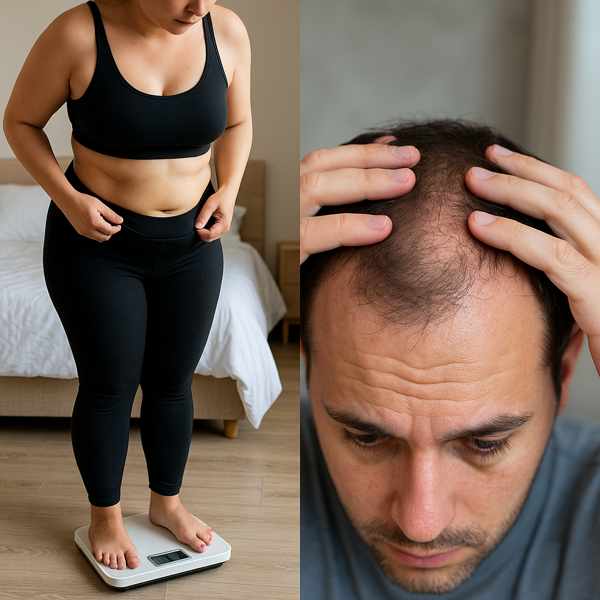
Understanding the Hair Growth Cycle
![]()
The hair growth cycle has three main phases: anagen, catagen, and telogen.
- Anagen: This is the growth phase. It lasts 2-7 years. Hair grows longer during this time.
- Catagen: This is a short transition phase. It lasts about 2-3 weeks. Hair stops growing but doesn’t fall out yet.
- Telogen: This is the resting phase. It lasts around 3 months. After this, hair falls out and new hair begins to grow.
Normally, most of our hair (about 85-90%) is in the anagen phase. Only a small percentage is in the telogen phase.
When someone experiences hair loss, it means more hairs have entered the telogen phase too soon. This is known as telogen effluvium.
There are two types of telogen effluvium: acute and chronic. Acute telogen effluvium happens suddenly and usually resolves within six months. Chronic telogen effluvium lasts longer than six months and may need medical attention.
Weight loss, especially rapid weight loss, can trigger telogen effluvium. It disturbs the normal hair growth cycle.
Knowing the hair growth cycle helps us understand why hair loss happens and how to address it. Proper nutrition and balanced diets support a healthy hair growth cycle.
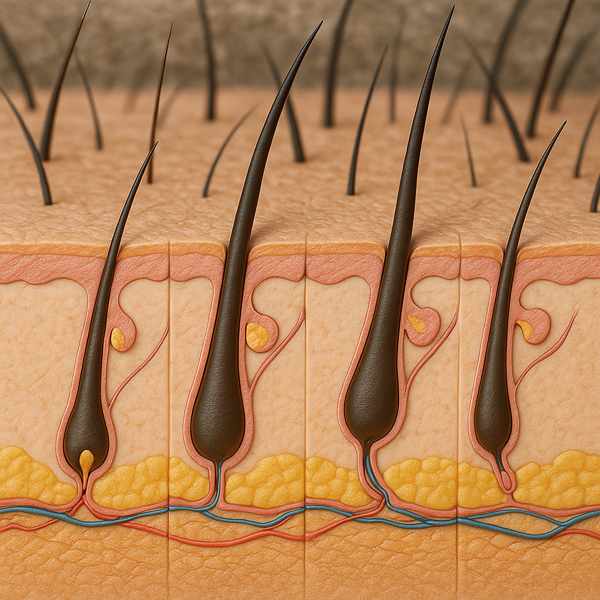
Impact of Weight Loss Surgery on Hair
![]()
Weight loss surgery is a major procedure to help people lose weight. It changes how the digestive system works.
People who undergo weight loss surgery might experience hair loss afterward. This is because the body goes through many changes after surgery.
- Nutrient absorption: Surgery can affect how the body absorbs nutrients. This can lead to deficiencies.
- Dietary restrictions: After surgery, people must follow strict diets. These diets might lack essential nutrients for hair health.
- Stress from surgery: The body views surgery as a form of stress. This can trigger hair loss.
Hair loss with weight loss surgery is usually temporary. Most people notice hair regrowth within a few months.
A healthcare provider can recommend supplements to prevent nutrient deficiencies. Iron, zinc, and biotin are common supplements for promoting hair growth.
Staying hydrated and eating protein-rich foods can also support hair health after surgery.
It’s important to discuss any concerns about hair loss with a healthcare provider before and after surgery. They can provide guidance tailored to individual needs.
Understanding the potential impact of weight loss surgery on hair helps patients prepare better and take preventive measures.
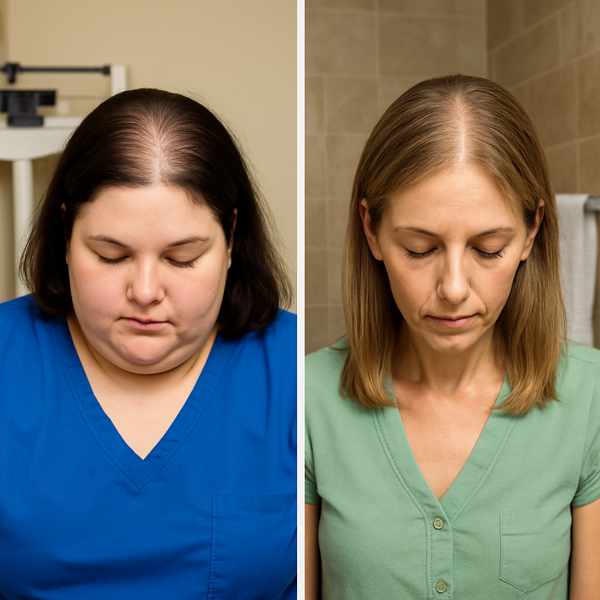
Nutrient Deficiencies That Causes Hair Loss
![]()
Nutrients play a crucial role in maintaining healthy hair. Certain deficiencies can lead to hair loss.
- Iron deficiency: Iron helps red blood cells carry oxygen to hair follicles. Without enough iron, hair growth slows down.
- Zinc deficiency: Zinc supports cell growth and repair. Lack of zinc can weaken hair structure.
- Protein deficiency: Hair is made of protein. Not getting enough protein can cause hair to become thin and brittle.
- Vitamin D deficiency: Vitamin D stimulates hair follicles. Low levels can affect hair growth.
People following restrictive diets might miss out on these important nutrients. This can lead to temporary hair loss.
Ensuring a balanced diet with a variety of foods helps prevent deficiencies. Foods rich in iron, zinc, and protein include lean meats, beans, nuts, and eggs.
Supplements can also help fill nutritional gaps. It’s best to consult a healthcare provider before starting any supplements.
By addressing nutrient deficiencies, individuals can promote healthier hair and reduce the risk of hair loss during weight loss.
Awareness of nutrient needs is key to achieving weight loss goals without compromising hair health.
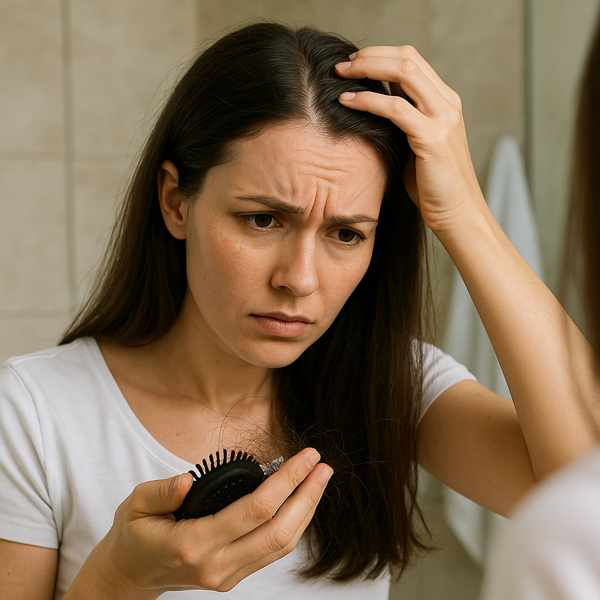
Hair Loss and Excess Supplementation: Thyroid Effects You Need to Know
![]()
Hair loss can be a distressing experience, and while there are many potential causes, one factor that sometimes goes unnoticed is the impact of excessive supplementation on the thyroid gland. The thyroid is a small, butterfly-shaped gland located in the neck, but it plays a big role in regulating various bodily functions, including metabolism, energy levels, and hair growth. When the thyroid is not functioning properly, it can lead to hair loss among other health issues.
Excessive supplementation, particularly with certain vitamins and minerals, can negatively affect the thyroid. For instance, taking too much iodine, which is crucial for thyroid hormone production, can actually disrupt thyroid function. While iodine is necessary for the thyroid to produce hormones, too much of it can lead to conditions like hyperthyroidism or hypothyroidism. Both of these conditions can cause hair to thin or fall out as the body’s natural processes become imbalanced.
Similarly, over-supplementing with other nutrients like selenium and vitamin D can also impact thyroid health. Selenium is important for the conversion of thyroid hormones into their active forms, but too much can lead to toxicity and potential thyroid dysfunction. Vitamin D, while essential for overall health, can also influence thyroid function, and an imbalance can contribute to hair loss.
It’s important to approach supplementation with caution and ideally under the guidance of a healthcare professional. They can help ensure that you’re getting the right amount of nutrients without overdoing it. If you’re experiencing hair loss, it’s worth considering whether your supplement intake might be affecting your thyroid. A balanced diet, regular medical check-ups, and careful management of supplements can help maintain both your thyroid health and your hair.
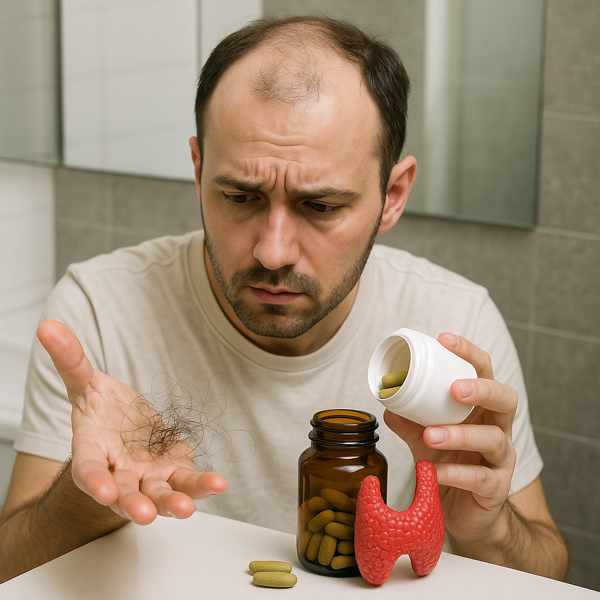
Promoting Hair Growth During Weight Loss
![]()
Maintaining healthy hair during weight loss requires a holistic approach. Here are some tips:
- Balanced diet: Eat a variety of foods to get all necessary nutrients.
- Stay hydrated: Drink plenty of water to keep hair hydrated and strong.
- Avoid stress: Practice relaxation techniques like yoga or meditation to reduce stress.
- Gentle hair care: Use mild shampoos and avoid excessive heat styling.
- Regular trims: Trim hair regularly to prevent split ends and breakage.
Certain foods are particularly beneficial for hair health. For example, salmon is rich in omega-3 fatty acids, which promote shiny hair. Spinach provides iron and vitamin C, supporting healthy hair growth.
Some people find natural remedies helpful. Aloe vera and coconut oil are popular for nourishing the scalp and hair.
In cases of severe hair loss, professional treatments may be needed. Hair transplant and other medical options are available for treating significant hair loss.
A healthcare provider can suggest appropriate treatments based on individual needs and conditions.
Taking proactive steps can help maintain both a healthy weight and healthy hair during weight loss journeys.

Top Hair Loss Treatments That Truly Promote Hair Growth
![]()
Hair loss can be a distressing experience for many people, but the good news is that there are several effective treatments available that can help promote hair growth and restore confidence. One of the most popular and well-researched treatments is minoxidil, a topical solution that is applied directly to the scalp. Minoxidil is known for its ability to stimulate hair follicles and increase blood flow to the area, which can encourage new hair growth. It is available over-the-counter and is often recommended for both men and women experiencing thinning hair.
Another widely used treatment is finasteride, an oral medication that is particularly effective for men dealing with male pattern baldness. Finasteride works by blocking the production of a hormone called DHT, which is responsible for shrinking hair follicles and slowing down hair growth. By reducing DHT levels, finasteride can help prevent further hair loss and promote regrowth in some cases. It’s important to note that this medication requires a prescription and should be taken under the guidance of a healthcare professional.
For those seeking a more natural approach, there are also numerous supplements and topical treatments containing ingredients like biotin, saw palmetto, and essential oils. These can support hair health and improve overall scalp condition. Additionally, lifestyle changes such as eating a balanced diet rich in vitamins and minerals, managing stress levels, and avoiding harsh hair treatments can also contribute to healthier hair growth.
Lastly, advanced treatments like laser therapy and hair transplant surgery are available for individuals seeking more immediate or dramatic results. Laser therapy uses low-level lasers to stimulate hair follicles and improve hair density, while hair transplant surgery involves moving hair follicles from one part of the scalp to areas experiencing thinning. These options can be more costly but have shown promising results for many people.
Overall, the best approach to treating hair loss is often a combination of these methods tailored to an individual’s specific needs and circumstances. Consulting with a healthcare provider can help determine the most effective treatment plan.
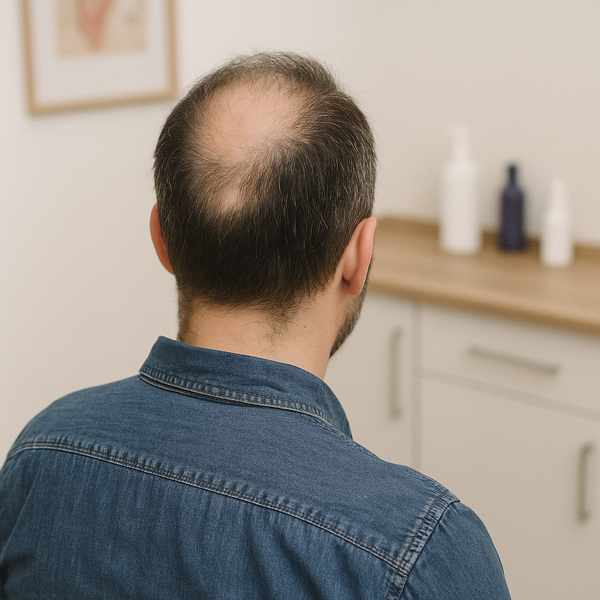
Conclusion: Hair Loss Risk Factors
![]()
Weight loss and hair loss are interconnected, but understanding the link helps manage both effectively. Rapid weight loss and nutrient deficiencies are common causes of hair loss during dieting.
Recognizing the importance of the hair growth cycle aids in addressing hair loss issues. Weight loss surgery can impact hair health, but with proper care, hair regrowth occurs.
Nutrient deficiencies and excessive supplementation play a significant role in hair loss. Ensuring a balanced diet and consulting healthcare providers for supplements can help prevent deficiencies.
Adopting a holistic approach promotes healthy hair during weight loss. Balanced diets, hydration, stress management, and gentle hair care are key strategies.
Overall, achieving balance between weight and hair health is possible with the right knowledge and actions. By taking these steps, individuals can reach their weight goals without sacrificing their hair’s vitality.